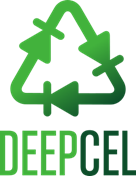DEEPCEL - The Digital Electronic with Eco-designed Paradigm in Collaborative Enhanced Learning
 Topics:
Topics:
Eco-design in Electronic Education | Retrofit and Up-cycling | Eco-design of Reconfigurable digital electronics and applications
Summary:
The environment and the fight against climate change must be included in every engineering educational content in order to propose coherent knowledge and tools that are really operational and useful for our students and for future generations. In the field of electronics, the challenge is enormous. As shown in the periodic table of element scarcity (from EuChemS.eu), digital electronics is responsible for massive material depletion. Almost the entire periodic table is affected and the world is threatened by scarcity due to the non-circular massive integration of e.g. indium, gallium or lithium into digital electronic products such as smartphones. In addition, the carbon footprint associated with each digital chip is extremely high compared to any other manufactured object relative to its mass.
Therefore, one of the core ideas of the DEEPCEL project is to define a new teaching paradigm and green skills for electronics, where we start from the planetary boundaries and follow step by step the Life Cycle Assessment of any digital electronic product. In this way, we ensure that we can pass on the same knowledge as before, while taking into account ecological constraints from the outset.
This must be done in collaboration with experts and taking into account transdisciplinary knowledge. In practice, we will need to train the professor to produce new standards for digital electronic teaching “beyond growth”. In addition, several courses and activities will be proposed as real pedagogical (remote) laboratory activities to be defined, prepared, tested and offered on three main topics: (A) eco-design of reconfigurable digital electronics solution, (B) system reuse/retrofit using reconfigurable electronics, (C) minimalist deep learning embedded predictive maintenance to extend the lifetime of complex systems.
Digital transformation will be addressed in the DEEPCEL project as a continuation of the DECEL project. We will continue to propose remote Open Educational Resources (OER) and Real (Remote) Laboratories (RRL), both physically and remotely accessible minimizing the carbon footprint. The environmental context will force us to revise the contents and methodologies in order to adapt them to the sustainability applied to the digital electronics transformation.
In the DEEPCEL project, the intensive use of open hardware combined with open documentation and openly accessible teaching materials will strongly contribute to inclusion and diversity by reducing barriers related to education and training systems. Every resource produced will be open source and accessible in our platforms. For our events, student’ profiles recruitment will be as inclusive and diverse as possible.

Project details
Scientific responsability: Cristian Zambelli
Funding source: ERASMUS+
Key Action: KA220-HED - Cooperation partnerships in higher education
Action Type: Cooperation among organizations and institutions
Project Reference: 2024-1-FR01- KA220-HED-B42BA894
Start date: 01-12-2024 - end date: 30-11-2027
Total budget: 250.000,00 €
Contribution to UniFe: 62.500,00 €
Participants
- Universite de Tours (Coordinator), France
- Universidade do Porto, Portugal
- Università degli Studi di Ferrara, Italy
- Universidad de Alcalà, Spain
